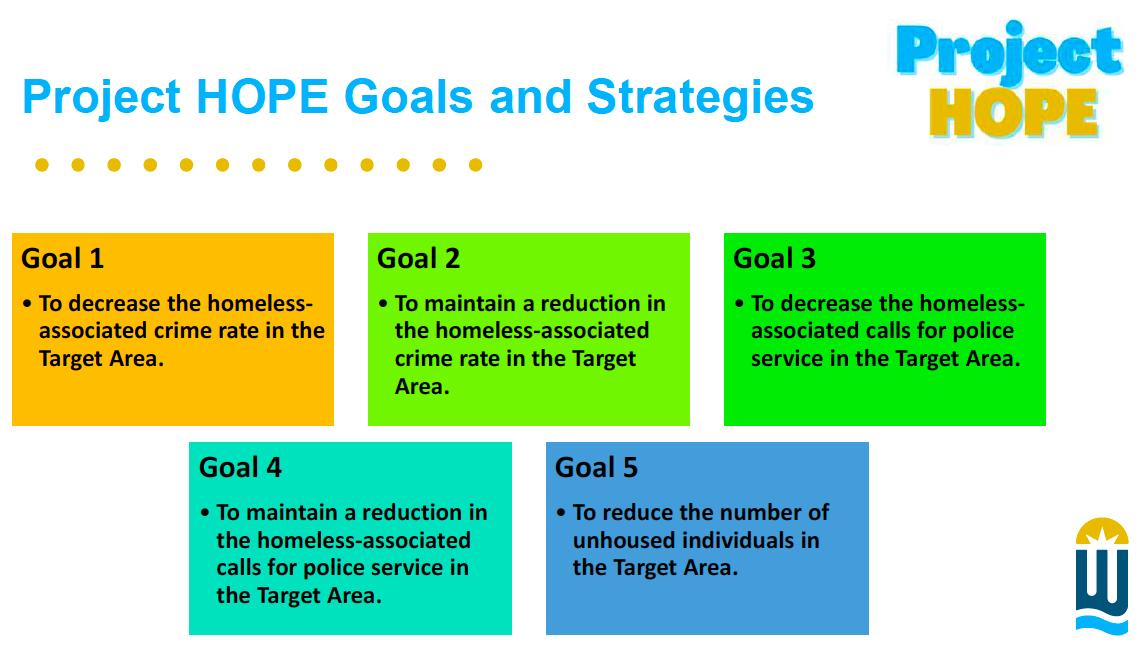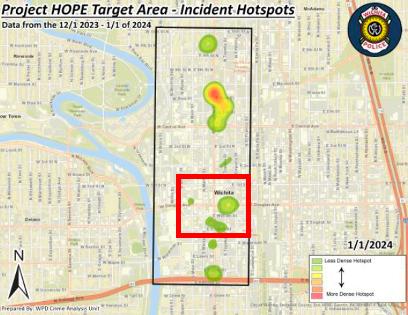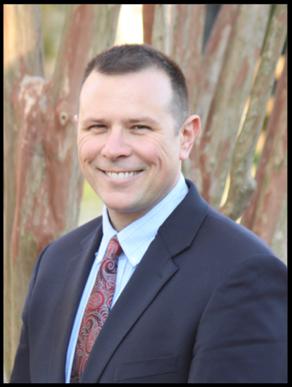




Spotlight: Wichita, Kansas
October 2024


Wichita, the largest city in Kansas, is committed to providing services, resources, and housing to people experiencing homelessness. Since its creation in 2013, the Wichita Police Department's (WPD) Homeless Outreach Team (HOT) and its partners have successfully reduced the city's homeless population by 77% (KAKE, 2019) and has received national recognition as a best practice from the U.S. Department of Justice COPS Office, the U.S. Department of Justice Bureau of Justice Assistance, the U.S. Interagency Council, the National League of Cities, and Wichita local media outlets.
In 2020, Wichita received a $1,000,000 Byrne Criminal Justice Innovation (BCJI) grant through the U.S. Department of Justice (DOJ) Office of Justice Programs and the Bureau of Justice Assistance (BJA) This funding was the seed for Project HOPE (Homeless Outreach Proactive Engagement), a collaboration of agencies and organizations, including the Wichita Police Department, Wichita Housing and Community Services, and Newman University. Project HOPE identifies its mission as "to reduce crime by building community partnerships between local law enforcement, city departments, community organizations, businesses, and residents (both housed and unhoused) and increasing safety in a defined Target Area" (City of Wichita, 2024).
In 2022, the International Association of Chiefs of Police (IACP) introduced Safe Night LLC to Project HOPE to provide training and technical assistance through the BCJI grant. In October 2023, Safe Night staff traveled to Wichita to teach Project HOPE partners the Proactive Alliance relationship-based approach in support of their multidisciplinary model. Wichita was the first U.S. city to use the Proactive Alliance relationship-based approach to compassionately manage people experiencing homelessness in their community.
As part of the BCJI grant, Project HOPE and WPD submitted a site action plan to outline how they intend to use funding and achieve grant goals Project HOPE prioritizes datadriven, place-based interventions focused on building partnerships and remaining community-oriented (City of Wichita Project HOPE Site Action Plan, 2022). Their site action plan included Safe Night's Proactive Alliance relationship-based approach to accomplish the goal of "building partnerships" for the Leadership Council and their staff.

“The Team will coordinate and deliver several educational programs to law enforcement and public and private service providers. The overall goal of the selected programming will be to improve connectivity between the criminal justice system and the social service system within the Target Area. Ideally, an increased understanding of the relationship between criminal behavior and homelessness throughout the community will decrease the homeless arrest rate in the Target Area. To this end, the Safe-Nights’ Proactive Alliance will be delivered to select Wichita Police Department officers, and the Homeless Outreach programming (seminar) will be delivered to the Leadership Council as part of the educational strategy” (City of Wichita Project HOPE Site Action Plan, 2022).

The Proactive Alliance relationship-based approach is an empathy-based, trauma-informed method of community engagement rooted in counseling psychology and social work. It prioritizes multidisciplinary collaboration from the standpoint of prevention and compels enforcement agencies to proactively seek out community stakeholders to build relationships and form problem-solving partnerships. This approach is the foundation for municipal and enforcement agencies to establish and maintain trust with people experiencing homelessness, collateral agencies, and community service providers.

Proactive Alliance is drawn "from criminological theory and evidence-based principles in counseling psychology to teach police officers specific, immediately applicable techniques to establish rapport and long-term working relationships with community stakeholders. The training addresses two key challenges of community-oriented policing: building meaningful collaboration across diverse communities and empowering frontline officers to become change agents in pursuit of the 'co-production' of public safety" (Gill & Mastoras, 2021). In sum, Proactive Alliance teaches municipal agencies the skills to maximize resources and build lasting partnerships among agencies and with various community stakeholders.

Prior to Proactive Alliance training, a majority of Wichita attendees reported a need to prevail in a power struggle, and half believed that "having empathy" meant agreeing with someone's perspective (Proactive Alliance RelationshipBased Policing Training Attendee Survey Summary, 2023).
After Proactive Alliance training, attendees reported:
• Feeling better equipped to collaborate with other municipal agencies
• Proactive Alliance improved how they view the community
• A majority agreed that disengaging from a power struggle can be an effective option
• 18 out of 20 attendees agreed that having empathy means understanding someone's perspective, not necessarily agreeing
• 19 of 20 attendees agreed that Proactive Alliance changed their view of themselves


Please state your level of AGREEMENT with the following statements.
I learned some practical skills to use when talking with individual business owners and managers.
I
I
Based on what you have learned in the training, please mark whether each of the following statements is TRUE or FALSE.
An essential component of the Proactive Alliance training is helping municipal agencies understand and support a unified outreach strategy. Although Wichita devoted considerable time and resources to reducing homelessness, city agencies were not collaborating effectively.
"Proactive Alliance legitimized and validated my work and the mission of the HOT program. I now understand how to use the relationships I have developed and how to replicate our strategies with more partners."
- Officer Nate Schwiethale, Wichita Police Department, Lead HOT Officer
Proactive Alliance relationshipbased training incorporates breakout workshops focused on actual, local community problems. During these sessions, attendees brainstorm and present actionable ideas to initiate collaborative problemsolving In Wichita, attendees identified concerns about a concentrated area with camping, litter, and loitering in the Douglass Corridor at 300 N. Topeka Avenue. During the breakout workshop, the team laid out the specific tasks and necessary stakeholder relationships to boost their collective problemsolving. The team agreed on the following actionable tasks:

1. Meet with AT&T facility leadership to determine if AT&T would be willing to contribute to security fees. Additionally, WPD HOT could inquire if AT&T would be willing to install fencing on the side of N. Topeka Avenue.
Result - (Oct 2023 - May 2024) WPD HOT developed a relationship with AT&T Security Director Bill Carroll, who agreed to assist with cleanups and request additional security patrol funds. The security manager is currently working to secure funding for a fence.
2. Partner with Open Door, a non-profit service provider, to provide gift cards to people experiencing homelessness as an incentive to clean and remove litter in that area.
Result - (Oct 2023 - May 2024) WPD HOT partnered with several people experiencing homelessness to clean litter from the streets of the target area. WPD HOT's efforts have succeeded, as the area appears much cleaner. Open Door has purchased more gift cards to continue the program.

3. Request more trash cans from the city to use in the target area and empty these trash cans more frequently.
Result - (Oct 2023 - May 2024) WPD HOT initiated a relationship with Wichita Public Works Supervisor Jason Waters, who added four new trash cans to the target area.
4. Establish an alliance with Joe Schroeder, Chief Operating Officer at Union Rescue Mission (URM), to increase cleanup efforts at the abandoned URM building at 334 N. Topeka.
Result - (Oct 2023 - May 2024) URM committed to cleaning every Monday and responds on weekends if necessary.
5. Establish a relationship with Saint John's Episcopal Church's leadership to address the trash produced by their weekend food service.
Result - (Oct 2023 - May 2024) By communicating more regularly with church leaders, WPD HOT discovered that St. John's Episcopal Church now offers food through the front door instead of its large parking lot and provides trash bins to better control litter. St. John's leadership has been increasingly helpful in guiding people experiencing homelessness toward city-accepted providers.
On May 28, 2024, the authors interviewed Director Sally Stang and Officer Schwiethale to determine how Proactive Alliance had changed their perspectives and ability to be more effective in their mission.
Has Proactive Alliance improved your competency to build relationships?
Director Sally Stang: "From the housing department lens, [Proactive Alliance] gave more credence to the work. While we've worked with WPD in the past, this was the first opportunity to build the knowledge of the intent of Project HOPE and really build relationships that might not have been there before. Even before the staff walked out of the final day of training, they were discussing new relationships and strategies they wanted to try that they never thought about until Proactive Alliance. "

" My team follows the HUD rules, and they tend to be very black and white. But Proactive Alliance helped with the idea of embracing the gray and identifying opportunities to do something differently."
- Director Sally Stang, Wichita Housing and Community Services
Officer Nate Schwiethale: "Understanding how vital individual relationships are for furthering HOT's work and capacity. It has also shown our command and executive staff that our work is ongoing and needs to be consistently supported."
you explain how Proactive Alliance increased your capacity for problem-solving?
Director Sally Stang: "I think [Proactive Alliance] really got people to think differently than they were used to. I think they walked away [with a] feeling of autonomy and more prepared to try and tackle something a little bit differently When we have a challenging client or case, by the time it gets to me, staff have already tried the typical ways to manage the case. We can't give up on a client because our typical responses are not working. Proactive Alliance made us
consider what else we could be doing to reach the 20% of clients that are not accepting services."
Officer Nate Schwiethale: "We now have additional service providers (mental, health, substance abuse, Veterans Affairs, adult protective services, sexual assault), and outreach workers willing to come out and develop relationships alongside WPD HOT. We can address just about any issue that we face to get the client's case moving."
How does PA influence your ability to manage your responses to resistant or hard-to-reach stakeholders?
Director Sally Stang: "A non-profit organization that serves people experiencing homelessness has been difficult to collaborate with at a hot spot for homelessrelated crime. In the Proactive Alliance training, we focused on modifying our approach to include the non-profit organization in problem-solving. As a result of our improved communication and training, the property organization's staff now works together with WPD HOT, and we've seen a reduction in calls-for-service related to homelessness.
Additionally, the non-profit organization is now working with Project HOPE and WPD HOT to make service providers available to engage the people experiencing homelessness who will not accept services because of mental illness or substance abuse. There is a pilot program underway that is reviewing and strategizing how to make progress with the four of the most challenging clients."
Officer Nate Schwiethale: "The Proactive Alliance workshop was incredibly helpful because I felt many of my co-workers needed to understand how relationship building is an essential skill, not traditional community policing. Officers and other agencies need to understand that their negative interactions with people experiencing homelessness can hurt the mission of HOT. I feel like I now have an understanding of the 'why' the work I do is so needed and important."
Director Sally Stang: "It has made us realize we've just scratched the surface of what is possible when we have the right partners in place. Project HOPE needs more relationships and partners at the table who have more skills and knowledge to increase the capacity for better case management."
Officer Nate Schwiethale: "Proactive Alliance legitimized much of the work I do day-to-day. I can also demonstrate to commanders why we do the work of building relationships that further problem-oriented responses in the future."
Overall feedback from the community reported to WPD indicates that target areas have significantly improved in regard to litter and encampments. For example, between January 2023 and August 2023, the N. Topeka Avenue target area contained twelve (12) homeless encampments. Between August 2023 and March 2024, after the city incorporated Proactive Alliance into their intervention efforts, the target area dropped to five (5) homeless encampments, a reduction of 58.3% (Wichita Police HOT, 2024). During the same period of intervention at the N. Topeka Avenue target area, the city saw a rise in camp cleanups from 140 to 168, an increase of 20% (Wichita Police HOT, 2024).


During a Project HOPE leadership meeting in May 2024, Housing and Community Services Director Sally Stang suggested that improved communication is driving the notable changes to hotspots and the decrease in incidents. She credited the Proactive Alliance relationship-based training for these improvements, which have enhanced stakeholder collaboration and problem-solving. WPD HOT members noted that improved coordination and communication with the Union Rescue Mission also contributed to these successes. Project HOPE Grant Coordinator Angeline Johnson emphasized a significant decrease in campingrelated issues in the area following the implementation of Proactive Alliance strategies.
Internally, WPD HOT worked to align the efforts of the WPD downtown enforcement team with the Project HOPE mission. As a result of the Proactive Alliance training, the WPD teams coordinated and focused on a strategic problem-solving plan. Crucially, WPD downtown enforcement officers better understood the overall goal of Project HOPE and could contribute to this larger effort by shifting from reactive enforcement of hotspots to coordinated problemoriented strategies.
An analysis of crimes associated with homelessness suggests that the WPD HOT is successfully increasing problem-solving and intervention efforts. Data analyses of the N. Topeka Avenue target area are as follows:
Lexus Nexis, 2024
The reductions in criminal offenses in the N. Topeka Avenue target area coincide with the prioritization of relationship-building and interagency collaboration to enhance problem-solving and interventions.
WPD HOT officers offered their perspectives on how Proactive Alliance impacted their work specifically. They reported understanding the importance of:
1. Focusing on place-based data
2. Considering the environmental factors contributing to encampments and crimes associated with homelessness
3. Developing individual relationships and building trust with property owners, business owners, and residents to assist in changing conditions; Identifying environmental factors alone was not enough.
4. Eliciting help from businesses and other city agencies requires education on the mission of Project HOPE and ongoing relationship-building
The capstone task of the Proactive Alliance training included WPD HOT and Housing and Community Services creating an action plan to incorporate their new knowledge and insights. They crafted a blueprint based on each agency's responsibilities and limitations and prioritized relationship-building with community
stakeholders. Creating an agreed-upon action plan is essential for sustainability, including successfully onboarding new team members and maintaining the continuity of the project despite inevitable turnover.



Since 2013, the Wichita Police Department Homeless Outreach Team and Wichita Housing and Community Services have successfully reduced Wichita's chronic homelessness by an impressive 86% (Wichita Police HOT, 2024). Additionally, working with the Housing First program and other community providers has helped more than 1,200 people move from homelessness into permanent or transitional housing and reunited over 700 people experiencing homelessness with family members.
Despite their remarkable success and national recognition, why did the WPD HOT program and Project HOPE choose to incorporate the Proactive Alliance relationship-based approach? The answer is sustainability - a challenge nearly all successful programs face With a well-defined action plan, a clear understanding of team member roles, and a united approach to community engagement, new team members can quickly adopt the project's values and methods. A second concern was the perception that the police department had returned to arrests and enforcement as their primary tool, a common cause of friction in collaborative community efforts to manage homelessness Learning the Proactive Alliance approach validated that prioritizing collaboration and relationshipbuilding are the most effective management tools for all team members.
Wichita is not alone in its struggle to maintain a sustainable homeless outreach and engagement team. Many wraparound programs and homeless outreach policing teams across the U.S. do not use a systematic relationship-based model like Proactive Alliance However, a program using a teachable relationshipbased model as its foundation can overcome the natural course of position turnover due to retirements, promotions, and transfers of assignments. Further, programs and teams that use evidence-based research and practices are more likely to endure or have staffing reallocated when budget cuts inevitably occur. Perhaps most importantly, a foundational model gives team members the language and evidential support to legitimize the importance of their work. Once relationship-building is valued as essential to community problem-solving, supervisors can properly value team members' efforts and advocate for their support.
City of Wichita. (2022). Project HOPE Site Action Plan https://www.wichita.gov/DocumentCenter/View/8977/Project-HOPE-SiteAction-Plan-PDF?bidId=
City of Wichita. (2024). Project Hope https://www.wichita.gov/415/Project-HOPE
Gill, C., & Mastoras, M. C. (2021). Proactive Alliance: Combining policing and counselling psychology: This article is related directly to the 6th International Law Enforcement & Public Health (LEPH) Virtual Conference in March 2021. Journal of Community Safety and Well-Being, 6(3), 112117. https://doi.org/10.35502/jcswb.193
KAKE. (July 2, 2019). KAKE News. "As homeless problem mounts, other cities can learn from Wichita HOT team." http://www.kake.com/story/40737673/as-homeless-problem-mountsother-cities-can-learn-from-wichita-hot-team
Lexis Nexis. (2024). Community Crime Map. https://communitycrimemap.com/datagrid
Molly C. Mastoras, MA, LPC Co-Founder, President
Molly Mastoras is a Licensed Professional Counselor (LPC) in Virginia and Connecticut. She has worked as an assistant program director and probation counselor for the Fairfax County Juvenile & Domestic Relations District Court and as a social worker for the Fairfax County Office for Women and Arlington County Child Protective Services (CPS). Molly has worked extensively with survivors of sexual assault throughout her career, leading to the creation of Safe Night Active Bystander, a sexual assault prevention and intervention training program.

She developed the Proactive Alliance relationshipbased approach, which teaches police and enforcement agencies to develop relationships to enhance problem-solving with the community using adapted counseling therapy concepts. She co-authored several articles, including Proactive Alliance in IACP Police Chief Magazine and Productive and Proactive in Sheriff & Deputy Magazine and Proactive Alliance: Combining Policing and Counselling Psychology in the Journal of Community Safety and Well-Being with Dr. Charlotte Gill.
Molly has presented the Proactive Alliance concept at the American Society of Evidenced-Based Policing (ASEBP) conference, the Problem-Oriented Policing (POP) Conference, and the International Conference on Law Enforcement & Public Health (LEPH). Molly also serves on the Board of Directors for the Washington Regional Alcohol Program (WRAP).
Co-Founder, Executive Vice President
Dimitrios (Jim) Mastoras is the co-founder and executive vice president of Safe Night LLC, a global consulting firm that provides strategies to improve policing, public safety, and economic viability. A native of Albany, New York, Jim served as a Master Police Officer in Arlington County, Virginia, for almost twenty-four years and was named Arlington’s first nightlife liaison. Jim’s nightlife management model was recognized as a national model to reduce alcohol-related violence and harm by the U.S. DOJ COPS Office in a toolkit he authored, The Arlington Restaurant Initiative - A Nightlife Strategy to Improve Safety and Economic Viability.

Jim is a senior Proactive Alliance relationship-based policing instructor teaching police and collateral city agencies how to establish trustful relationships with community stakeholders to shift to collaborative problem-solving. The Proactive Alliance relationship-based approach has been used to address many complex community issues across the U.S., including alcohol-related violence, homelessness, and traffic safety and engagement. He is also a nightlife safety and community engagement expert who regularly speaks at national conferences.
Jim has authored or contributed to numerous articles and case studies for the National Policing Institute, Policing Insight, IACP Police Chief Magazine, NSA Sheriff & Deputy Magazine, and Observatory of Public Sector Innovation.
